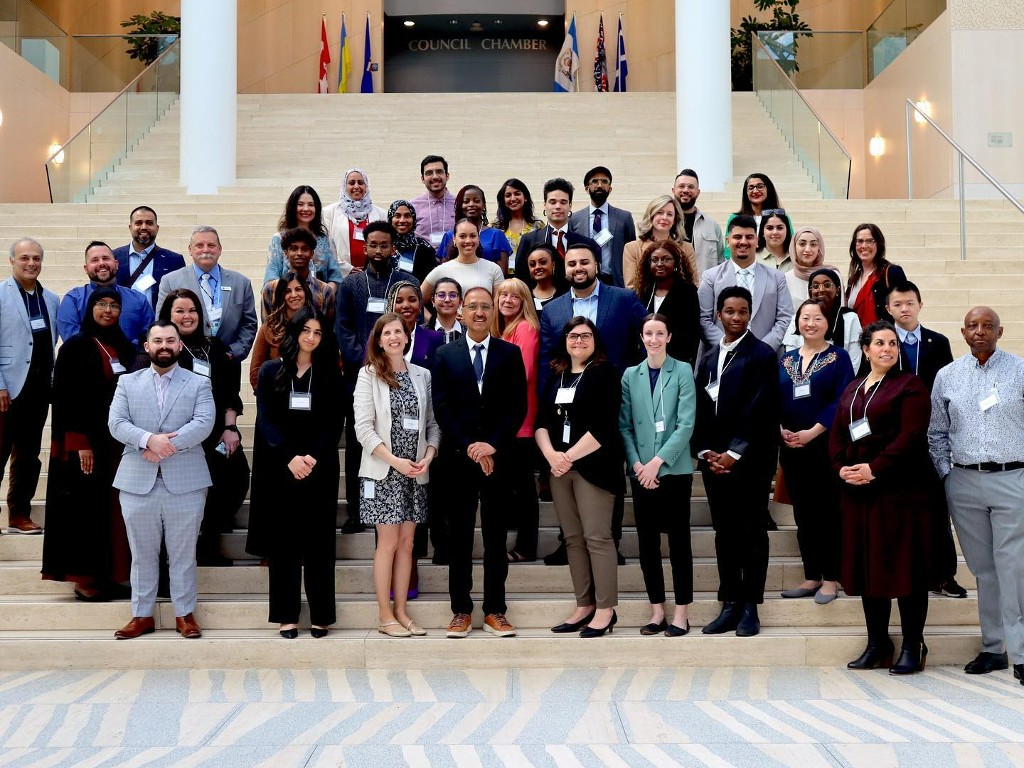A new fellowship has paired 13 equity-deserving youth with members of Edmonton's city council for internships that prioritize two-way learning rather than top-down instruction.
Participants in the Civic Youth Fellowship began their eight-week internships on May 1. It's a valuable opportunity to learn and be heard, said Omar Yaqub, servant of servants for Islamic Family (IFSSA), which was one of the "key conveners" for the program.
"I'm thinking back to myself as a youth, and I wouldn't have even imagined this (opportunity). I think about how it'll change the way people understand and access civics," he told Taproot. "It's one thing to think about civics as this impenetrable thing, this thing that might be distant. It's another thing to think, 'I see an issue or I see an opportunity, I'm going to text my city councillor because I have a good relationship with them and see what we can get done.'"
The point of the Civic Youth Fellowship is to offer young people opportunities while simultaneously training politicians to better engage with Edmonton's various communities.
"When we think about the youth who are selected, they come because they bring access to networks," Yaqub said. "It's incredibly important for our municipal leaders to gain access to those perspectives."
Tiger Bellerose, 24, applied to be part of the fellowship after Sarah Dharshi from the mayor's office reached out to him. Dharshi helps Bellerose with the social media for nimihitotân, the Indigenous-led dance collective he co-founded.
Bellerose is one of three fellows paired with Mayor Amarjeet Sohi. He said his perspective has been welcomed and encouraged since beginning his internship.
"Whenever I go into any space, what I notice first and foremost is that oftentimes I'm the only Indigenous person within that space. Even though it can be intimidating … it's really one of my biggest strengths," he told Taproot.

Civic Youth Fellows, including Tiger Bellerose (back row, wearing a red tie and hoop earrings), gathered in the City Room with members of Edmonton city council, administration, and organizations that helped make the fellowship possible. (Keren Tang/Facebook)
A member of the Driftpile Cree Nation, Bellerose grew up in Stony Plain, apart from his culture. He's graduating from university this year with a degree in sociology.
"When I went to the University of Alberta, that's when I really started to take hold of my Indigeneity," he said. "When I heard of this opportunity, it really set my heart on fire to really have that opportunity to be that representation, but also be that voice for my community."
To get into the program, Bellerose submitted a hypothetical project pitch on "revitalization of Indigenous culture in the City of Edmonton," with programming at kihcihkaw askî, a newly developed natural area for Indigenous ceremony and intergenerational learning.
Bellerose has since had a chance to work on a policy brief for the mayor.
"We did a collaborative briefing note together about a housing project (that compared) Edmonton, Vancouver, and Calgary. Just to see how were the other cities doing, and what's working for them what's not, so that we can really come together and be like, 'How do we really improve the housing for the Edmonton community?'"
'Opinions that should shape the city'
The idea for the fellowship came from a meeting between Yaqub and Mohammed Hashim, the executive director of the Canadian Race Relations Foundation. That foundation has been part of a similar model in Toronto that has operated since 2017. "He has seen this work really, really well," Yaqub said.
Edmonton's fellowship is a collaboration between the Africa Centre, the Canadian Race Relations Foundation, kihêw waciston at MacEwan University, the City of Edmonton, and IFSSA.
They "spent a few months just kind of imagining what this could look like, building up the logistics, the timings, all those things," Yaqub said. "Then we actually had a fairly robust open call."
More than 80 people applied for the inaugural fellowship, and the selection process "was a very, very tight competition," Yaqub said.
The fellows are now working on projects such as planning public engagements in new ways, coming together to discuss transit safety, and more. In some cases, youth get to work on issues directly related to their passions and lived experience.
"When we're trying to get opinions that should shape the city, it's actually important that we put the effort into engaging different and new audiences," Yaqub said. "With the youth, we have some opportunities to try out some of these different ways of doing engagement that will reach audiences that are hitherto unreached."
This isn't the first program to improve representation in Edmonton's municipal politics. Last year, Parity YEG and Women's Advocacy Voice of Edmonton (WAVE) collaborated on a virtual policy competition that led to 13 women and gender-diverse people receiving mentorship from members of council.
